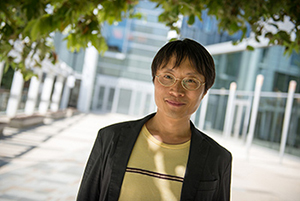Composer-in-Residence Lei Liang Bids Farewell to Qualcomm Institute
Published Date
By:
- Tiffany Fox
Share This:
Article Content

Lei Liang
As his three-year tenure as Composer in Residence at the University of California San Diego Qualcomm Institute comes to a close, UC San Diego Music Professor Lei Liang is reflecting not only on the internationally recognized composition he created while at QI, but also the development of what he calls a “new musical language for myself.”
The chef d’oeuvre of his residency, known as “Hearing Landscapes,” paired a contemporary musical composition by Liang with high-resolution, multispectral scans of 12 rare Chinese landscape paintings by 20th-century artist Huang Binhong (1865-1955). Created by a team led by Falko Kuester, Director of QI’s Center of Interdisciplinary Science for Art, Architecture and Archaeology (CISA3), these scans — rendered in visible light and at ultraviolet, infrared and other wavelengths of the electromagnetic spectrum — illuminate the painter’s creative process by capturing detailed information (big data) about the materials, techniques and artistic processes used by Huang.
The scans inspired Liang to develop new concepts of sonic “shadows” and “lights” to craft a musical language for orchestration and sound spatialization — work that was funded by a Calit2 Strategic Research Opportunities grant in 2014. (Calit2 is the California Institute for Telecommunications and Information Technology, QI’s parent institute). The project also, linguistically speaking, required Liang to learn the language of engineers (and quid pro quo) in order to achieve his vision.
“It is a project that could only have happened at UC San Diego and nowhere else,” said Liang, who, during this interview, was en route to China to teach as Guest Professor at the Beijing International Composition Workshop. “My residency at QI is the most inspiring experience I had since I arrived at UC San Diego almost nine years ago, and my unique experience is a testimony to the vision of QI, which offers an extraordinary environment for collaboration and interdisciplinary experimentation.”
In addition to Kuester, Materials Science Ph.D. student Samantha Stout and CISA3 programmer-analyst Chris McFarland, Liang also collaborated closely on the sound design for “Hearing Landscapes” with researchers on the QI Sonic Arts R&D team, including Zachary Seldess and Eric Hamdan, led by Sonic Arts Director Peter Otto, as well as QI affiliate Greg Surges. Two robotics engineers – Eric Lo and James Strawson – custom-built the automated scanning and imaging robot that the team used to speed up the capture of the high-resolution, multispectral images.
In parallel, Liang also worked with QI photographer Keita Funakawa on a documentary film about Hearing Landscapes, called “Deriving Worlds.” The short film premiered at QI in 2015 and was also part of the 2016 Filmatic Festival hosted by QI. (Liang’s publisher, Schott Music, wrote about the film here).
“My collaborators each contributed to the project that helped to enrich my perspective,” remarked Liang. “It was an inspiring team that I felt fortunate to be part of. As a result, our project changed my own musical approach in a fundamental way. When you bring together gifted and inspiring people from seemingly unrelated fields, something magical might emerge, and that's what happens here.”
The composer’s residency also caught the attention of classical music station WQXR Radio in New York City, which ranked the Qualcomm Institute residency program as one of seven “uniquely inspiring residencies for composers.” (Liang was only the third Composer in Residence in the institute, following Pulitzer Prize winner Roger Reynolds, and Rand Steiger, who chaired the Music department at UC San Diego prior to beginning his residency in QI.)
Currently the interim chair of the Music department, Liang was born in China and pursued his studies at the New England Conservatory. During his Ph.D. studies at Harvard University he became an activist devoted to the research and preservation of traditional Asian music. A Young Global Leader at the World Economic Forum, he held fellowships from the Harvard Society of Fellows and the Paul & Daisy Soros Fellowships, and also taught in China as a distinguished visiting professor at Shaanxi Normal University College of Arts in Xi'an. Prior to coming to UC San Diego, he served as honorary professor of composition and sound design at Wuhan Conservatory of Music and as visiting assistant professor of music at Middlebury College.
Liang is also the recipient of a number of prestigious awards and distinctions, including the Rome Prize and a Guggenheim Fellowship. While Composer in Residence at QI, Liang was short-listed for the 2015 Pulitzer Prize for Music for his concerto "Xiaoxiang" (for saxophone and orchestra), a collaboration with the musicians of the Boston Modern Orchestra Project, conductor Gil Rose, and saxophonist Chien-Kwan Lin. Together with San Diego-based Art of Élan, a group that works to expand the scope of classical music through innovative programming in unique performance venues, Liang also received a Koussevitzky Commission Grant from the Library of Congress for a piece for the Formosa Quartet titled “Song Recollections,” which premiered in San Diego in March (Reynolds is a past recipient of the grant). Liang has also been commissioned by the New York Philharmonic and the Taipei Chinese Orchestra.
Liang noted that he plans to build on his “experimentation” at QI to compose an orchestral piece entitled “A Thousand Mountains, A Million Streams,” which is being commissioned by the Boston Modern Orchestra Project and will be completed by the end of this year. He also plans to work on an opera titled "Inheritance" that will address the issue of gun violence in American culture. Liang’s successor as Composer in Residence at QI is expected to be announced this summer.
Share This:
Stay in the Know
Keep up with all the latest from UC San Diego. Subscribe to the newsletter today.



